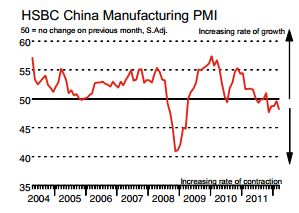Bonds continued their march to lower yields today. US 10’s now yield 1.56%, UK 10’s yield 1.56%, German 10’s yield 1.2%… and Spanish 10’s yield 6.5%. The extent to which European capital is cycling out of Spanish (and to a lesser extent Italian) paper and into German paper is extreme. German bonds that traded with negative yields yesterday held their prices, and according to Bloomberg the benchmark German 2-year is hovering at zero as this is being typed. In a way, the resiliency of equity markets is surprising considering the bearish outcomes priced in to the government bond market.
Equity markets in North America were mixed today with US equities flat while Canadian equities came in moderately positively (+0.72%). The catalyst in Canada was strong bank earnings: Canadian financial companies posted strong earnings over the past week and the sector rebounded accordingly today. Canadian financials were up by 1.55% (banks by 1.9%) while US financials were up by a more modest 0.85% (banks by 1.4%). Oil and Gas stocks held up moderately well in Canada (+0.11%) considering that WTI for delivery in July sold off by 1.4% and is currently trading at US$86.58/bbl.
Europe is clearly taking center stage at the moment, with headline like the FT website’s banner “Spain Reveals €100bn Capital Flight” garnering deserved attention (the details of the Banco De Espana study cited by the FT are slightly less bad: the capital flight occurred during Q1. But that leaves open the question ‘how much capital fled in Q2?’). With Europe gaining so much media space, we thought it might be worth turning the reader’s attention to data released in the US today which might have been overlooked – which were unfortunately rather bleak.
The official purchasing managers index (PMI) fell to 50.4 last month from 53.3 in April, the China Federation of Logistics and Purchasing says.
[Banner name=”News Trading Banner”]
Euro Dollar:
EURUSD (1.2349) The US dollar has risen against the euro as investors seek safety from fears that debt-riddled Greece may leave the eurozone and Spain’s banking troubles may require an international rescue.
The euro hit a fresh 23-month low at $US1.2337, before recovering to trade at $US1.2361, down from $US1.2366 at the same time Wednesday.
The Great British Pound
GBPUSD (1.5376) Sterling fell to a four-month low against the dollar as worries about the extent of Spain’s problems and the risks that it may have to seek outside aid to bail out its banks drove investors into safer assets.
Traders also reported month-end related selling of sterling, particularly against the euro. However, it was expected to resume its recent rise versus the euro soon as investors seek alternatives to euro zone assets.
Sterling fell 0.6 percent against the dollar to a low of $1.5360, its weakest since mid-January. Further losses would see it heading towards the early January low of $1.5234.
Analysts said although sterling was likely to be driven mainly by events elsewhere, any hints the Bank of England could resort to more quantitative easing may weigh further on the UK currency.
Bank of England Deputy Governor Charlie Bean on Thursday said the BoE had scope for more asset purchases, although recent comments from other policymakers suggest the bank is still divided on the issue.
The euro was up 0.5 percent at 80.29 pence, recovering from a two-week low of 79.71 pence struck on Wednesday.
Despite the bounce, it was seen vulnerable to selling. This could see it retesting the trough of 79.505 hit earlier this month, its lowest since November 2008.
Asian –Pacific Currency
USDJPY (78.43) The European currency plummeted against Japan’s yen, to ¥96.82 from ¥97.76 the prior day. Earlier it sank to ¥96.51, its lowest level since December 2000.
The US dollar also weakened against the yen, to ¥78.33 compared with ¥79.06 late Wednesday.
The euro was one of May’s worst-performing currencies, having shed nearly 7.0 per cent of its value against the greenback and more than 9.0 per cent against the yen.
Gold
Gold (1555.65) edged lower as investors weighed weaker manufacturing data against the weaker US dollar.
The most actively traded contract, for August delivery, fell $US1.50, or 0.1 per cent, to settle at $1,564.20 a troy ounce.
Crude Oil
Crude Oil (86.20) prices have dived to fresh seven-month lows, driven by weak data in the United States and the dollar’s rally against the euro amid worries of a possible Spain bailout, dealers say.
New York’s main contract, West Texas Intermediate crude for delivery in July, tumbled $US1.29 to $US85.53 a barrel on Thursday, its lowest level since October 20.
In London, Brent North Sea crude for July slumped $US1.60 to settle at $US101.87 per barrel.

Comments are closed.